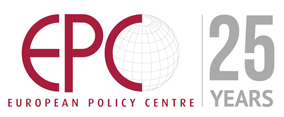(13 September 2023, European Policy Centre – EPC)
Speaker:
- Bujar Osmani, Minister of Foreign Affairs of North Macedonia
Moderator:
- Corina Stratulat, Senior Policy Analyst and Head of the European Politics and Institutions Programme, European Policy Centre
The speaker started with stating not being sure whether he can say anything new, but having regard to the 20th anniversary of the Thessaloniki Summit, he definitely did reflect on North Macedonia-EU relations. According to him, North Macedonia is the litmus test of EU enlargement.
The country has been a candidate for 18 years now, but no chapters have been opened so far. North Macedonia has shown commitment and determination, but the process has been slow – partly because of the naming dispute with Greece – which weakened the credibility of the EU. Osmani highlighted that, because the only driving force for his country is credibility.
The Minister of Foreign Affairs also pointed out that Western Balkan countries in general have no alternative to joining the EU – historically, economically, culturally, they’re connected to the EU. Subtly referring to the situation of Ukraine, he noted that EU enlargement is not a security policy per se, so geopolitical issues shouldn’t be projected to it.
Osmani welcomed that the importance of the integration of the Western Balkans has been confirmed by the President of the European Council, Charles Michel’s speech in Bled, and the President of the European Commission, Ursula von der Leyen’s State of the Union address. For him, it signifies a new momentum. 2030 provides a frame, credibility. “North Macedonia will be ready” – he confirmed. Will the EU though?
The Minister of Foreign Affairs made it clear that there’s no alternative: North Macedonia won’t accept anything but full membership in the EU. But the country is frustrated, and so is the EU. The former, because of the shaken credibility which has produced more nationalistic narratives and made the region susceptible to other influences. And the latter, because of the fear of getting North Macedonia sooner and, at the same time, because of the fear of losing it.
It’s worth remarking that the country scored best on EU reports, making it a frontrunner among candidates. But the current EU approach on enlargement is all or nothing. The question is how to fill the gaps? North Macedonia would like more integration before the actual membership. A strategic shift from the formal moment of membership to a merit-based process.
Osmani envisages a different system, where the candidates could enter e.g. the single market after fulfilling the criteria, before the membership. The EU would get to know North Macedonia and the other candidates better too. He also mentioned that 2030 is beyond his mandate, but he would still like to see some progress. And even though the EU is in a comfortable position, the people of North Macedonia would be more on board if there were some changes.
Talking about the democratic criteria, the Minister of Foreign Affairs agreed that countries should prove that they can fit into the system. Opening up the rule of law mechanism to accession countries, as von der Leyen said in her State of the Union address, could be another good monitoring tool. These all provide added value, just like the Common Regional Market, a product of the Berlin process.
He did a little summary about how North Macedonia has evolved over the past years. In 2020, it became the 30th NATO member, and it went from security consumer to provider. The country chairs the Organization for Security and Co-operation in Europe in 2023, which proved to be quite a challenging year. North Macedonia decided to focus on field operations. Its overarching priority is Ukraine, and to serve the people in Ukraine.
Osmani stated that the OSCE proved its value and importance. But there are some issues that make the current situation difficult. The budget hasn’t been approved since 2021, the next chair has not yet been defined, and the level of trust is historically low, because of the zero-sum game approach. The special monitoring mission and office intended to be set up in Ukraine haven’t been realized because of the lack of consensus.
The European Political Community which was created as a response to Russian aggression also came up. The Minister of Foreign Affairs emphasized that it is not an alternative to joining the EU, it’s complementary to it. Within the EPC, Charles Michel intends to meet with Western Balkan leaders, but Osmani thinks it wouldn’t make much sense to use every possible platform for membership talks, especially because it’s a separate process.
On internal affairs, Osmani highlighted that North Macedonia is a functional multiethnic democracy which went against the mainstream and proved that it can work in the Western Balkans. According to him, the country is in a unique stage of its democracy and has good neighbourly relations with Greece, and now with Bulgaria too.
But to continue its EU accession process, North Macedonia still has duties, like making amendments to its constitution – something that it has already done because of the EU, even if the response from the EU did not seem proportional. Nonetheless, the country is working on its progress report, and brainstorming on what would be acceptable for both parties. In October or November, something shall come out of this.
In relation to the Ukraine-Georgia-Moldova Trio, Osmani said that his country believes in cooperation and sharing experiences and, given how long it has been in the process, North Macedonia certainly has a lot to share.
Video recording of the event:

